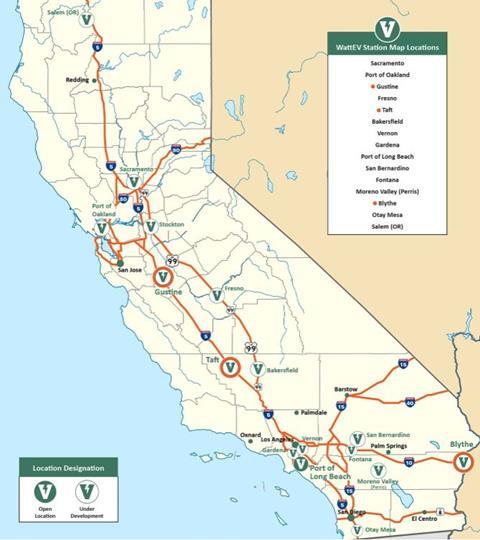The new grant funding will be used to develop three new commercial vehicle charging sites in California as the west coast state continues its drive to decarbonise the road freight transportation sector.

The funding, awarded in partnership with the San Joaquin Valley Air Pollution Control District (APCD) and the City of Blythe, will support the construction of three additional commercial electric truck charging depots in California. This grant marks the largest financial allocation in the current FHWA grant cycle for any individual charging infrastructure developer nationwide.
WattEV CEO Salim Youssefzadeh highlighted the significance of the FHWA funding awards, coming on the heels of a $33.6 million grant received in late 2023 from the Transportation Corridor Enhancement Program. The total recent federal funding for WattEV now amounts to $109 million.
The grants aim to advance the development of essential public truck charging infrastructure, crucial for the success of commercial freight electrification on the West Coast and beyond. The awarded funds will be utilised to establish charging stations along important freight transportation corridors in California, extending from San Diego to Seattle and expanding eastward toward Arizona.
WattEV has spent the past three years launching the first corridor for public-access medium- and heavy-duty electric vehicle (MHDEV) charging. Additionally, the company offers an electric Truck-as-a-Service (TaaS) model, providing fleets with access to Class 8 battery-electric trucks, maintenance support, insurance, and charging across WattEV’s network at a total cost of operation comparable to diesel trucks, the company claims.
The recent FHWA grants comprise two separate awards through the Charging and Fueling Infrastructure Discretionary Grant Program (CFI) 2023-24 grant cycle. The first grant of $56 million, shared with San Joaquin Valley APCD, will fund two truck charging sites in Taft and Gustine, California, supporting zero-emissions goods movement along the I-5 freight corridor. The second grant of $19.6 million, in collaboration with the City of Blythe, is designated for a multi-class electric vehicle charging facility on a 127-acre parcel of land in Riverside County, California, near the state line with Arizona.
The funded charging sites are expected to provide charging for over 46,000 trucks annually, incorporating a combination of CCS and MCS chargers. Both the Taft and Gustine sites will feature acres of solar panels and battery electric storage systems to ensure grid stability and optimise pricing for WattEV’s customers.
WattEV is also pioneering the adoption of the new MCS charging standard, aiming to enable rapid recharging at its depots for semi-trucks, with up to 300 miles of range in just 20 minutes. The FHWA grants will support the expansion of WattEV’s MCS charging network, enhancing truck drivers’ ability to recharge quickly and resume their routes. The first MCS chargers are set to debut at WattEV’s Bakersfield charging depot in early 2024, funded in part by the California Energy Commission.


















